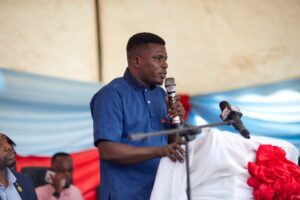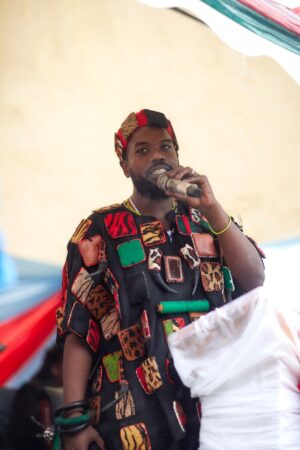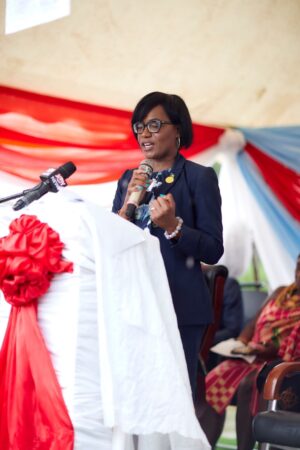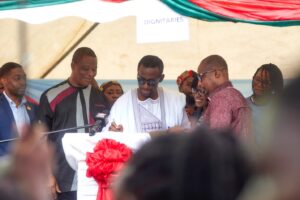It has been five years since Ghana launched the ‘Year of Return’, beckoning sons and daughters of African slaves taken to Europe, the Americas and the Caribbeans to return to their roots.
In 2019 alone, when the initiative was launched, nearly one million people from the diaspora came to Ghana, according to the country’s Tourism Ministry. One of them was Christopher Davis, a historian and curator from the Caribbean Island of Bahamas, who was researching for his book ‘Black Rinse’. In that study, Chris was looking to trace the story of the Junkanoo Festival, the most popular festival in the Caribbean and parts of the United States.

Around the same time, a young Ghanaian man was also keen on looking beyond the country’s borders to reconnect Ahanta, his motherland to some of its lost – and almost forgotten – sons and daughters back to their roots.
A lot happened in the three years that would follow and now, there’s a major breakthrough that holds great promise for Ahanta and the Bahamas. A great day is here! Sons and daughters of both lands have gathered for the signing of a historic pact.

It’s Saturday, June 10. It is raining heavily in Agona-Nkwanta, the capital of the Ahanta West Municipal Assembly.
Despite the heavy downpour of rains on the day, the entourage from the Island of the Bahamas – including M.P and Cabinet Minister Ginger Moxey, Asafohene Jan Kwaw (Christopher Davis), Queen Mother Asafokyereba (Angelique Mckay), and the Junkanoo Commandos – were only reminded of the stories of their ancestors’ struggles on slave ships from Ahanta to the Bahamas.
The Ghanaian delegation, led by Western Regional Minister Kwabena Okyere Darko-Mensah, expressed their appreciation of the sister-city agreement and assured the availability of space for trade and resettlement for Bahamians.

Seated at that ceremony were two young men, Stephen Kenyah and Christopher Davis, credited with lighting the fire that has blossomed into the flames that the gathering from both countries were experiencing on the day.
The two young men, one politician from Ahanta in Ghana’s Western Region and the other a researcher and historian from the Bahamas, though on opposite sides of the ocean, were working hard to better the lots of their people.
Stephen Kenyah Arthur is the Assemblyman for Butre in the Ahanta West Municipality. The 35-year-old politician says he understands the responsibility to seek development for his people, whether within the country or without.
This passion to bring personal and socio-economic development to his people struck gold in 2021 when Stephen met Christopher who had visited Princess Town as part of his research, and needed help navigating the place.
From serving as a tour guide, Stephen quickly connected with Davis’ passion to reconnect the people of the Bahamas to their roots in Ahanta, which connected seamlessly with his own passion to bring development to the teaming unemployed youths in his electoral area through trade.
In the months that followed, Stephen would support Christopher with all the help the latter needed for his research to establish the origins of the Bahamians to Ahanta land. This research culminated in a visit of the first lady of the Bahamas to Princess Town in 2022 and the coronation of Christopher as Asafohene Jan Kwaw by the chiefs and people of Princess Town.
Sensational performer, Taadi Akatasia of Talented Kidz fame, performing at signing ceremony
Asafohene Jan Kwaw II, as he is now called, found that the people of the Bahamas were slaves taken away from the Ahanta land by slave masters more than five centuries ago. He established through his research that the popular Junkanoo Festival originated from Princess Town in the Western Region of Ghana and is named after a son of the Ahanta Land, Jan Kwaw, who was taken away by slave masters.
According to Stephen, Christopher’s research helped to confirm the ancestral linkage between the people of Bahamas and Ahanta. “We were certain that the people of Bahamas and the People of Ahanta had a strong lineage. So, part of the things that we need to do is to link up with our brothers in the Caribbean, especially the Bahamas, and build together one union,” he said in an exclusive interview.
This began processes to sign a sister-city agreement between Nassau, the capital of the Bahamas and Princess Town, the origin of the Junkanoo Festival – known in Ghana as Ankos, with the primary objective to allow Ahanta and Bahamas to have one front in terms of trade, creative arts and socio-economic development.
Clad in a dark-green African 3-piece Kaftan, Stephen mounted the stage to speak at the signing ceremony amid cheers and praise-singing from the youths of the municipality who were present. His was a carefully worded speech, with his voice reverberating through the loudspeakers while the rains poured down in torrents.
“Today, the sons of our land have returned home, not in chains and not in assault. But they are in good health and have flown back home to reconnect with the people of Ahanta,” he echoed amid cheers and claps.

In the rather brief speech, the passionate young politician outlined the resource reserves of Ahanta that are not only testament to the history of slave activities in the area, but which he also considers to be the catalysts to realising the full potential of Sister-City Agreement. The resources, according to Stephen, include the forts and castles in the municipality and the vast arable and available land size (591 km sq.) which he indicated has just about 30 percent occupation.
According to the Ghana Statistical Services’ Population and Housing Census, about 75.3 percent of the population aged 15 years and older are economically active while 24.7 percent are economically not active. Of the economically active population, 6 percent are unemployed. For those who are economically not active, a larger percentage of them are students (48.0%), and 18.6 pecent perform household duties. The report also states that six out of ten unemployed in Ahanta are seeking work for the first time.
Stephen strongly believes that the agreement will bring the much-needed investment to the land and people of Ahanta, especially the teaming unemployed youth. According to him, his grand motive for pursuing the Sister-City Agreement is to enable and Ahantas and Bahamians establish trade, business and tourism relations. He believes that the best development partners for Africans are people of African descent in the diaspora.
He echoed this sentiment in his speech at the signing ceremony when he stressed: “Today, as we sign this Sister-City Agreement and set up a commission in place, we hope and pray that with the approval of the Non-Resident High Commissioner Office in Ghana, we are looking forward to our brothers and sisters from the Bahamas who are interested in investing in Ahanta”.
Stephen Kenyah Arthur is a shining example for all young people in Ghana, that no one is too young to do ethical and people-centred politics. He is working hard not only to reconnect Africans in the diaspora to their motherland, but he is also leveraging this to bring development to his people, and that is a true pan-Africanist.










